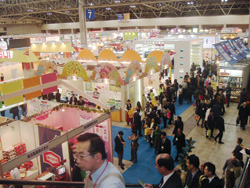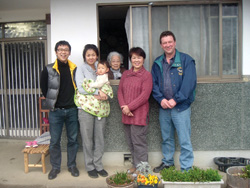
P.E.I. organic grower Raymond Loo
is bubbling over with enthusiasm about the possibility of a very
sizable market for black currants and black currant products in Japan.
 |
| Raymond Loo and Bruce McNaughton. |
P.E.I. organic grower Raymond Loo is bubbling over with enthusiasm about the possibility of a very sizable market for black currants and black currant products in Japan.
Loo, who has been growing organically for 11 years on his Springfield area farm, took part in a fact-finding mission to Japan in March 2005. “I was doing it from the opposite end,” he admits. “Instead of producing something and trying to sell it, I went to try to find out if there was a market and came back to see if we could grow it.”
The market that came out of his conversations with people in Japan involved black currants. “(They’re interested) because of the antioxidants and other health benefits. There is a big market growing in Japan for black currant extracts, jams, jellies – the whole thing.”
Black currants?
Out of a possible 50 crops that could be exported to Japan from P.E.I., Loo says he would have put black currants at
51 before the fact-finding mission. “It wasn’t even on the radar screen when I went there. We had been growing some on the farm for years but only on a very small scale.”
With the idea of importing black currant products from P.E.I. firmly implanted in the minds of some Japanese businessmen, Loo had no problem getting one of the people he met during his trip to visit the Island.
 |
| 2005 Food Ex |
 |
| Raymond Loo (far right) is seen here with Kousaku Morita (left), who owns the Showa Trading company; his wife, Mariko; baby Hina; Kazuko, Mariko’s grandmother, and Keiko, Mariko’s mother.
|
Last June, Kousaku Morita came to P.E.I. looking for crops to market in Japan. “He liked what he saw and we kept in touch by e-mail, wondering what we could do, how we could build a business,” says Loo.
The organic grower sent samples of jam from several different Island businesses, as well as some he had produced.
“Kousaku really liked the P.E.I. Preserve products,” he says.
When Kousaku returned in December 2005, Loo and a few people from P.E.I.’s Department of Agriculture took the businessman on a tour of several different farms, both organic and conventional.
FoodEx
That tour and a dinner meeting with Bruce McNaughton, owner of the P.E.I. Preserve Company in New Glasgow, resulted in Kousaku inviting both Loo and McNaughton to Tokyo’s FoodEx, held annually in March. According to Loo, Kousaku thought it would be beneficial for the men to see the show and allow the Japanese customers the opportunity to meet the people making the jam.
“In Japan it’s different (doing business),” says Loo. “You have face-to-face meetings and shake hands and they have to like the person and make this kind of interaction before going into business.”
Loo and McNaughton went to the food expo, which is considered the largest food trade show in Asia with 100,000 people attending.
“There were 2,000 exhibitors with almost every country in the world having a booth,” recalls Loo. “We were able to set up in Kousaku’s booth, the Showa Trading Company, and displayed P.E.I. pictures and books and had some jam for sampling.”
The two plan to return in March 2007 with a wider range of products to sell, rather then just samples. McNaughton says he is eager for the return trip.
“For me, it was a mind-opening experience to see it – just to see their attitude towards food and the food market – and the sheer numbers of people going through daily.”
It was also a great opportunity for McNaughton to observe how Japanese retailers value the promotion of growers to the consumer. “They want the market to be shared through the agriculture food chain right from the grower to the consumer.”
Marketing
The market for preserves is large in Japan with product from all around the world being sold at what McNaughton considers a “very high price.
“We will be able to capture a tiny bit of that Japanese market – that will keep us happy here on P.E.I.”
Marketing the black currant preserves in this kind of atmosphere is a great opportunity for McNaughton. “We make all our preserves by hand, so we can bring the story of the grower to the market in Japan,” he says, adding that P.E.I. is already admired in Japan.
There are also plans to build on that admiration through a web site. Retailers will be able to see, first hand, the black currants being grown and processed into jams and jellies on P.E.I.
“When they are sitting down having that jam in Tokyo, they will have a feeling – we hope – of a kind of companionship with P.E.I.,” says Loo, adding they will be selling more than just a bottle of jam from P.E.I. “We are selling the whole Anne of Green Gables land that is so big in Japan.”
And while the organic market in Japan may not be huge right now, Loo believes it will grow very rapidly. There is some interest currently being expressed by both processors and wholesalers.
“They are very interested in getting involved with organic,” says Loo, adding for many in Japan, when they think organic, they think P.E.I. and the island’s isolated atmosphere. “And because we have that Anne of Green Gables image, it is really suited for organic growing.”
Production and products
Plans are to have 1,000 black currant plants put in the ground in 2006. Currently, there are five Island farmers eager to become involved with the organic production.
“We need about 25 acres in order to get into this market and, of course, there are challenges,” says Loo.
The first challenge to overcome will be the purchase of a mechanical harvester within the next few years. Freezing and grading standards will also have to be worked out while McNaugton’s preserves business will need to become organically certified.
McNaughton and Loo hope to have about 3,000 bottles of strawberry, rhubarb, black currant, raspberry and blueberry jam ready for the end of this year. “I think we can do it,” says Loo. “I think we can get a value chain going when we all work together.
“The quality has to be very high because that’s a very demanding market. If we can produce consistent quality, I think we can have a very good industry.”
Black currants are not new to the Japanese food industry.
“Japan is now buying large volumes of black currants from a business woman in Quebec who is producing sugar infused black currants,” explains Loo.
Quebec operation actually uses black currants from Finland and Poland, processing them in accordance to what the Japanese market is looking for. Sugar infusion involves marinating the currants in a sugary syrup, allowing the liquid to seep into them and act as a preservative.
“They are similar to raisin snacks,” describes Loo. “The Japanese put them in plastic bags and sell them as snack foods.”
Kousaku visits Quebec regularly to observe the production process. “He wants to be guaranteed that it (black currants) will meet his standards,” says Loo.
Print this page